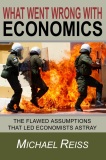Sunday, 28 November 2010
Mickanomics - the book!
It's about 70% complete and I'm now seeking feedback - you can view the current state of the book here.
Wednesday, 24 November 2010
Definition of the money supply
There seems to be little agreement about how the "money supply" should be defined, and I'm just now beginning to understand why. This can by illustrated by first giving my definition:
The money supply is the sum, for all people and businesses, at any single instant, of the answer to the question "How much money do you have at this instant that you are freely and legally able to buy things with".
At this point you may be thinking that this "definition" is rather sloppy because "freely" is rather vague. My answer to this criticism would be "Exactly! - and that's why economists can not agree of a more formal definition".
Its rather like the problems definition of defining almost any complex item. Say for example a "car". Imagine you had a slicing machine that could cut off thin slices of a car one by one. At what point would the remaining chunk of metal fail the definition of a car... its not so clear. Indeed it makes far more sense to say that its actually a "matter of degree" i.e. as the car gets slices taken off it becomes less and less like a car.
So now as an example, take a debatable point within the definition of the money supply - time deposits. If the time deposits are strictly enforced, i.e. there is no possibility at all of getting your money out early, then clearly this can not be considered part of the money supply. But what if you can take the money out early with some penalty - now its a grey area! Under my sloppy definition, I'd say the the degree to which the time deposit is part of the money supply is a function of the size and form of the penalty.
The money supply is the sum, for all people and businesses, at any single instant, of the answer to the question "How much money do you have at this instant that you are freely and legally able to buy things with".
At this point you may be thinking that this "definition" is rather sloppy because "freely" is rather vague. My answer to this criticism would be "Exactly! - and that's why economists can not agree of a more formal definition".
Its rather like the problems definition of defining almost any complex item. Say for example a "car". Imagine you had a slicing machine that could cut off thin slices of a car one by one. At what point would the remaining chunk of metal fail the definition of a car... its not so clear. Indeed it makes far more sense to say that its actually a "matter of degree" i.e. as the car gets slices taken off it becomes less and less like a car.
So now as an example, take a debatable point within the definition of the money supply - time deposits. If the time deposits are strictly enforced, i.e. there is no possibility at all of getting your money out early, then clearly this can not be considered part of the money supply. But what if you can take the money out early with some penalty - now its a grey area! Under my sloppy definition, I'd say the the degree to which the time deposit is part of the money supply is a function of the size and form of the penalty.
Saturday, 20 November 2010
The myth of fractional reserve banking and the monetary multiplier
Trying to get to the bottom of fractional reserve banking is hard work. But I discovered an unusually enlightening article here.
Friday, 19 November 2010
Subscribe to:
Posts (Atom)



